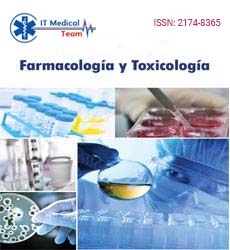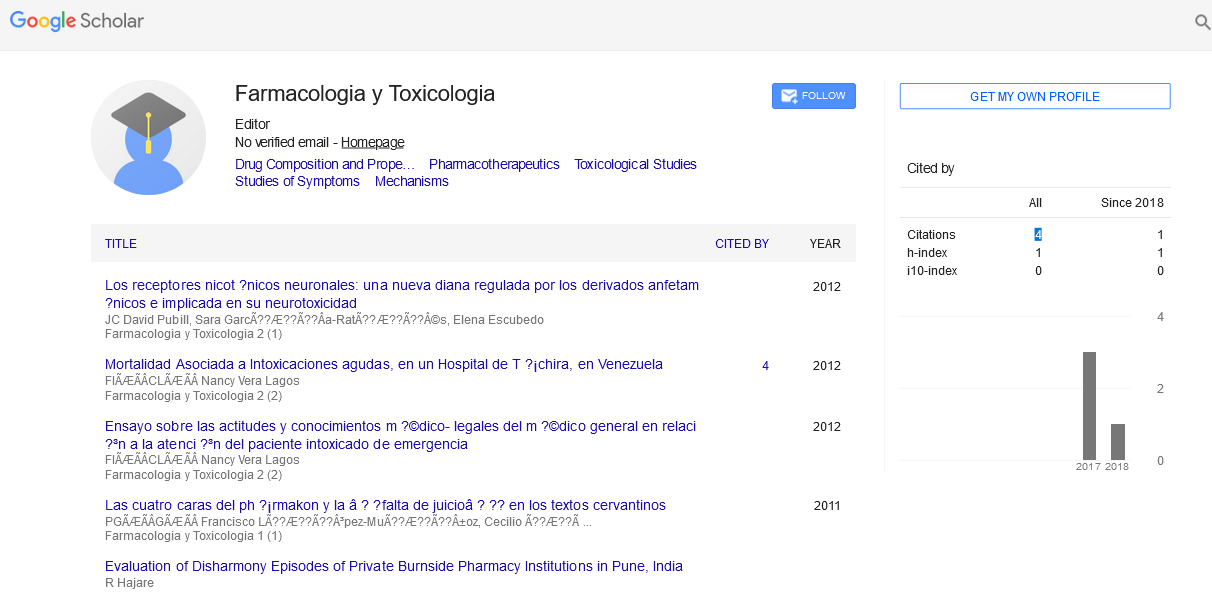Perspective - (2024) Volume 14, Issue 1
Pharmacology: Unraveling the Complex World of Chemicals in Biomedical Science
Hans Lennernas*
Department of Pharmacology, University of Edertern, Huddinge, Sweden
*Correspondence:
Hans Lennernas, Department of Pharmacology, University of Edertern, Huddinge,
Sweden,
Email:
Received: 10-Jan-2024, Manuscript No. IPFT-24-14473;
Editor assigned: 15-Jan-2024, Pre QC No. IPFT-24-14473 (PQ);
Reviewed: 29-Jan-2024, QC No. IPFT-24-14473;
Revised: 07-Feb-2024, Manuscript No. IPFT-24-14473 (R);
Published:
15-Feb-2024
Introduction
Pharmacology, a branch of biomedical science, is a field that
plays a pivotal role in understanding, discovering and
characterizing chemicals that influence living organisms. It is a
multidisciplinary science that combines aspects of chemistry,
biology and medicine to explore the interactions between
chemicals and biological systems. This article delves into the
fascinating realm of pharmacology, highlighting its key
principles, methodologies and its crucial role in advancing
healthcare.
Description
Defining pharmacology
At its core, pharmacology focuses on the study of drugs and
chemicals, encompassing their effects on the body, mechanisms
of action, therapeutic uses and potential side effects. The term
"pharmacology" is derived from the Greek words "pharmakon"
(meaning drug) and "logos" (meaning study). The discipline
encompasses a wide range of areas, including pharmacokinetics,
pharmacodynamics, toxicology and clinical pharmacology, each
contributing to a comprehensive understanding of how
chemicals interact with biological systems.
Pharmacokinetics: The journey of drugs in the body
Pharmacokinetics is the study of how the body processes
drugs from absorption, distribution, metabolism, to excretion.
Understanding these processes is essential for determining the
optimal dosage and frequency of drug administration.
Absorption refers to the uptake of drugs into the bloodstream,
while distribution involves the transport of drugs to various
tissues and organs. Metabolism, often occurring in the liver,
transforms drugs into metabolites, which can be either active or
inactive. Finally, excretion eliminates drugs and their
metabolites from the body, typically through the kidneys.
Pharmacodynamics: Exploring drug actions
Pharmacodynamics delves into the mechanisms by which
drugs exert their effects on the body. This includes interactions with specific receptors, enzymes or other cellular components.
Receptors, typically proteins on cell surfaces, play a crucial role
in mediating the effects of drugs. Drugs can act as agonists,
mimicking the body's natural signaling molecules or antagonists,
blocking these signals. Understanding these interactions is
fundamental for designing drugs that target specific pathways
and achieve desired therapeutic outcomes.
Toxicology: Balancing benefits and risks
While pharmacology aims to enhance health through drug
development, toxicology examines the potential harm
associated with chemical exposure. Toxicologists assess the
adverse effects of drugs, chemicals and environmental agents to
establish safe exposure limits. This ensures that the benefits of a
drug outweigh potential risks. The field of toxicology also plays a
crucial role in regulatory processes, guiding the approval and
monitoring of pharmaceuticals and other chemicals.
Discovery and development of pharmaceuticals
The journey from identifying a potential drug to its approval
and market availability is a complex and resource-intensive
process. Drug discovery involves identifying compounds with
therapeutic potential, often through high-throughput screening
of chemical libraries or targeted approaches based on
understanding disease mechanisms. Once a promising
compound is identified, it undergoes preclinical testing to assess
its safety, efficacy, and potential toxicities in laboratory settings.
Clinical trials: Bridging bench to bedside
Clinical trials are the bridge between preclinical research and
real-world application. These trials involve testing the safety and
efficacy of a drug in human subjects. The process is divided into
phases, starting with small groups of healthy volunteers (Phase
I) and progressing to larger groups of patients (Phases II and III).
The final phase assesses the drug's performance compared to
existing treatments, helping regulatory agencies make informed
decisions about approval.
Pharmacogenomics: Tailoring treatment to
individuals
Pharmacogenomics is an emerging field that explores the
impact of genetic variation on an individual's response to drugs.
Genetic factors can influence drug metabolism, efficacy and
susceptibility to adverse effects. Understanding these variations
enables the development of personalized treatment plans,
ensuring optimal drug responses based on an individual's
genetic makeup. Pharmacogenomics has the potential to
revolutionize healthcare by tailoring drug therapies to specific
patient profiles, maximizing benefits and minimizing risks.
Pharmacovigilance: Ensuring drug safety
post-approval
Even after a drug is approved and reaches the market,
pharmacovigilance plays a crucial role in monitoring its safety.
Adverse drug reactions, interactions and unexpected side effects
may emerge in larger populations. Pharmacovigilance involves
the ongoing surveillance, assessment and reporting of these
events, allowing for timely interventions to ensure patient
safety. The feedback loop created by pharmacovigilance is vital
for refining drug safety profiles and informing healthcare
professionals and the public.
Challenges and future directions
While pharmacology has made significant strides in improving
healthcare, challenges persist. Drug resistance, the high cost of drug development and the need for more effective and targeted
therapies are ongoing concerns. Additionally, the ethical
implications of emerging technologies, such as gene editing and
advanced drug delivery systems, require careful consideration.
The future of pharmacology holds promise, with
advancements in artificial intelligence and machine learning
aiding in drug discovery and personalized medicine. Precision
medicine, guided by a deep understanding of individual genetic
profiles, is likely to become more commonplace, offering
tailored treatment approaches for various diseases.
Collaborations between academia, industry and regulatory
bodies will be crucial in overcoming challenges and fostering
innovation in pharmacology.
Conclusion
Pharmacology, as a biomedical science, is a dynamic and everevolving
field that underpins modern medicine. From
understanding the intricacies of drug actions to navigating the
complex process of drug development, pharmacologists
contribute significantly to improving global health outcomes. As
technology continues to advance, the future of pharmacology
holds exciting possibilities, offering the potential for more
effective, personalized and safer therapeutic interventions. As
we unravel the mysteries of chemical interactions within the
human body, pharmacology remains at the forefront of scientific
discovery, paving the way for a healthier and more tailored
approach to medical treatment.
Citation: Lennernas H (2024) Pharmacology: Unraveling the Complex World of Chemicals in Biomedical Science. Farmacologia Toxicologia Vol.14
No.1





